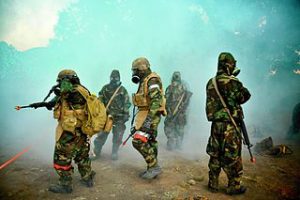Gabrielle Tarini
November 1, 2016
This article originally appeared in the Bulletin of the Atomic Scientists.
Officials gathering in Geneva next week to examine the status of the Biological Weapons Convention (BWC) will have a choice between plodding along with the current, broken process or taking concrete steps to reinvigorate a treaty that is integral to the international security landscape. For the 41-year-old treaty, the upcoming Eighth Review Conference is a pivotal opportunity for countries to take action to ensure that the treaty remains a relevant and useful tool for preventing the development, spread, and use of biological weapons.
[…]Given the speed at which science and biotechnology are advancing, more effective arrangements are needed to present, digest, and discuss relevant developments—including Crispr and others—and their implications for the BWC. There are already inherent challenges in meaningfully addressing science and technology in a diplomatic meeting, and the current process only exacerbates these difficulties rather than providing effective workarounds.

